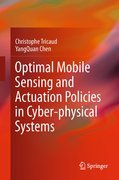
Optimal mobile sensing and actuation policies in cyber-physical systems
Tricaud, Christophe
Chen, Yangquan
A successful cyber-physical system, a complex interweaving of hardware and software with some part of the physical environment, depends on proper identification of the, often pre-existing, physical element. A bespoke “cyber” part of the system may then be designed from scratch. Optimal Mobile Sensing and Actuation Strategies in Cyber-physical Systems focuses on distributed-parameter systems the dynamics of which can be modelled with partial differential equations. These are very challenging to observe, their states and inputs being distributed throughout a spatial domain. Consequently, systematic approaches to the optimization of sensor location have to be devised for parameter estimation. The text begins by reviewing the field of cyber-physical systems and introducingbackground notions of distributed parameter systems and optimal observation theory. New research problems are then defined within this framework. Two important problems considered are optimal mobile sensor trajectory planning and theaccuracy effects and allocation of remote sensors. These are followed up witha solution to the problem of optimal robust estimation. Actuation policies are then introduced into the framework with the purpose of improving estimation and optimizing the trajectories of both sensors and actuators simultaneously. The large number of illustrations within the text will assist the reader to visualize the application of the methods proposed. A group of similar examples are used throughout the book to help the reader assimilate the material more easily. The monograph concentrates on the use of methods for which a cyber-physical-systems infrastructure is required. The methods are computationally heavy and require mobile sensors and actuators with communications abilities. Application examples cover fields from environmental science to national security sothat readers are encouraged to link the ideas of cyber-physical systems with their own research. Shows the reader how to optimize the positions of networked sensors to model challenging distributed-parameter systems. Demonstrates how cyber-physical systems can be used in applications from environmental science to national security. Extensive use of illustrations and related examples helps the reader toassimilate the ideas presented. INDICE: Introduction. Distributed Parameter Systems: Controllability, Observability and Identification. Optimal Heterogeneous Mobile Sensing for Parameter Estimation of Distributed Parameter Systems. Optimal Mobile Remote Sensing Policies. On-line Optimal Mobile Sensing Policies: Finite-horizon Control Framework. Optimal Mobile Actuation/Sensing Policies for Parameter Estimation off Distributed Parameter Systems. Optimal Mobile Sensing with Fractional Sensor Dynamics. Optimal Mobile Remote Sensing Policy for Downscaling and Assimiliation Problems. Conclusions and Future Work. Appendices: Notation; RIOTS Tutorial;Implentations.
- ISBN: 978-1-4471-2261-6
- Editorial: Springer London
- Encuadernacion: Cartoné
- Páginas: 178
- Fecha Publicación: 30/11/2011
- Nº Volúmenes: 1
- Idioma: Inglés
